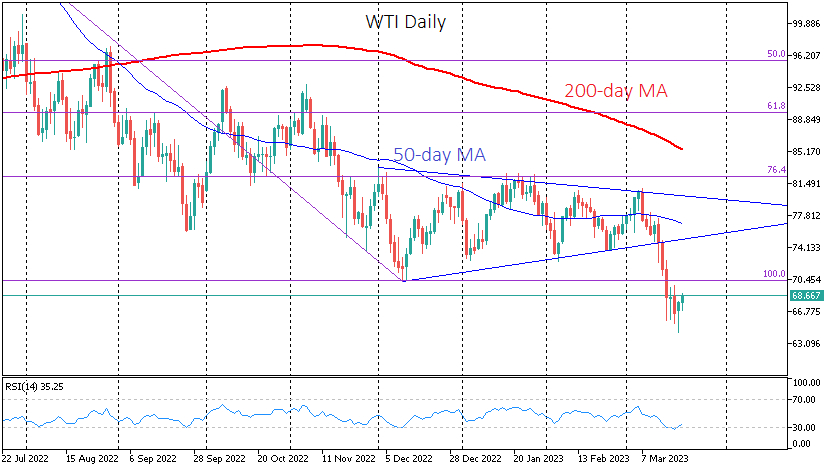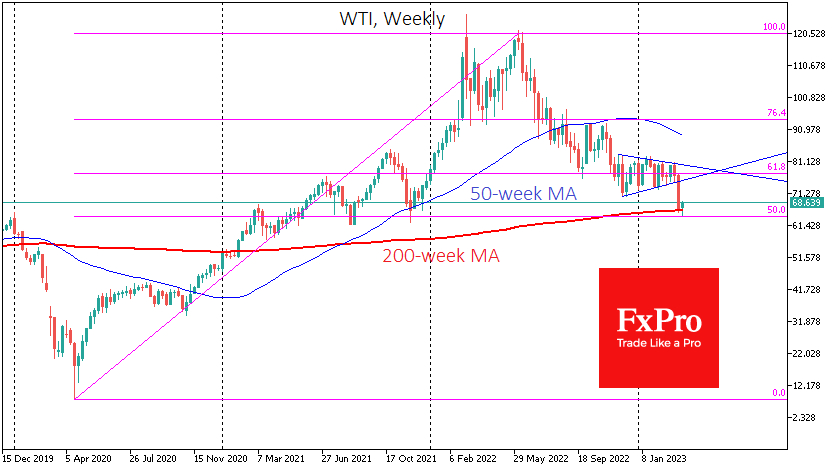By the start of European trading on Monday, WTI had lost over 20% from its high of $80.96 on 7 March to a low of $64.36. The sell-off that intensified last week may well be giving way to a new buying impulse in oil. Oil is broadly back in long-term equilibrium, and it would take a significant shift in the supply/demand balance to trigger a further sell-off or a new round of growth.
Between December and early March, prices consolidated in a narrowing range with an equilibrium point near $77/bbl. This pattern had a good chance of breaking the lower end of the spectrum.
Powell's speech to Congress sent oil out of risky assets on fears of a sharp rate hike. However, the lower boundary of the triangle was stormed by WTI on the contrary, on fears that the banking crisis would slow economic growth and dampen demand.
Technical factors played an equally important role in the bearish move: a break of the three-month range triggered a capitulation by medium-term speculators, reinforcing the downward movement.
The March sell-off took oil into the over-bought territory on the daily RSI. Yesterday's intraday reversal, complemented by today's buying, brought the index back into neutral territory, signaling at least a corrective bounce.
Moving to higher timeframes, oil buyers yesterday came back below the 200-week moving average after a short-term dip, which acts as a long-term trend indicator. Yesterday's approach to the $64 level has also been a turning point for oil over the past four years, working as resistance until April 2021 and support after that.
Yesterday's lows were also close to 50% of the entire spot trading range from the lows of April 2020 to the highs of June last year.
A change in fundamentals would be needed for oil to go permanently lower. For now, we are seeing attempts by central banks to stabilize banks, bringing back demand for risky assets. At the very least, this buys time for the oil to recover in the short term.
A pullback from meaningful levels could see WTI bounce back to $71.50 or even $74 in the coming weeks. However, a sustained rally above oil would require more than a technical shake-out but a change in the fundamental backdrop.
- English (UK)
- English (India)
- English (Canada)
- English (Australia)
- English (South Africa)
- English (Philippines)
- English (Nigeria)
- Deutsch
- Español (España)
- Español (México)
- Français
- Italiano
- Nederlands
- Português (Portugal)
- Polski
- Português (Brasil)
- Русский
- Türkçe
- العربية
- Ελληνικά
- Svenska
- Suomi
- עברית
- 日本語
- 한국어
- 简体中文
- 繁體中文
- Bahasa Indonesia
- Bahasa Melayu
- ไทย
- Tiếng Việt
- हिंदी
Crude Oil Finds Support
Published 03/21/2023, 07:27 AM
Updated 03/21/2024, 07:45 AM
Crude Oil Finds Support
Latest comments
Loading next article…
Install Our App
Risk Disclosure: Trading in financial instruments and/or cryptocurrencies involves high risks including the risk of losing some, or all, of your investment amount, and may not be suitable for all investors. Prices of cryptocurrencies are extremely volatile and may be affected by external factors such as financial, regulatory or political events. Trading on margin increases the financial risks.
Before deciding to trade in financial instrument or cryptocurrencies you should be fully informed of the risks and costs associated with trading the financial markets, carefully consider your investment objectives, level of experience, and risk appetite, and seek professional advice where needed.
Fusion Media would like to remind you that the data contained in this website is not necessarily real-time nor accurate. The data and prices on the website are not necessarily provided by any market or exchange, but may be provided by market makers, and so prices may not be accurate and may differ from the actual price at any given market, meaning prices are indicative and not appropriate for trading purposes. Fusion Media and any provider of the data contained in this website will not accept liability for any loss or damage as a result of your trading, or your reliance on the information contained within this website.
It is prohibited to use, store, reproduce, display, modify, transmit or distribute the data contained in this website without the explicit prior written permission of Fusion Media and/or the data provider. All intellectual property rights are reserved by the providers and/or the exchange providing the data contained in this website.
Fusion Media may be compensated by the advertisers that appear on the website, based on your interaction with the advertisements or advertisers.
Before deciding to trade in financial instrument or cryptocurrencies you should be fully informed of the risks and costs associated with trading the financial markets, carefully consider your investment objectives, level of experience, and risk appetite, and seek professional advice where needed.
Fusion Media would like to remind you that the data contained in this website is not necessarily real-time nor accurate. The data and prices on the website are not necessarily provided by any market or exchange, but may be provided by market makers, and so prices may not be accurate and may differ from the actual price at any given market, meaning prices are indicative and not appropriate for trading purposes. Fusion Media and any provider of the data contained in this website will not accept liability for any loss or damage as a result of your trading, or your reliance on the information contained within this website.
It is prohibited to use, store, reproduce, display, modify, transmit or distribute the data contained in this website without the explicit prior written permission of Fusion Media and/or the data provider. All intellectual property rights are reserved by the providers and/or the exchange providing the data contained in this website.
Fusion Media may be compensated by the advertisers that appear on the website, based on your interaction with the advertisements or advertisers.
© 2007-2025 - Fusion Media Limited. All Rights Reserved.
